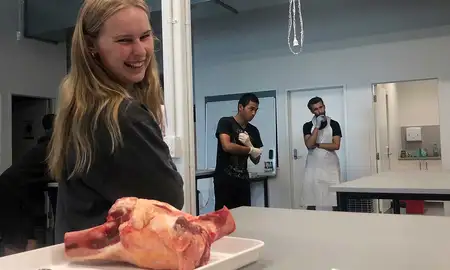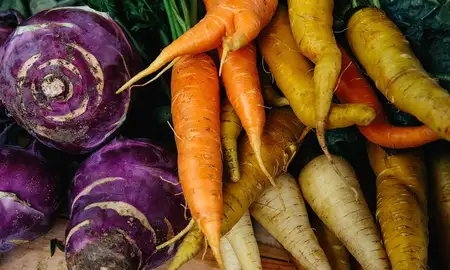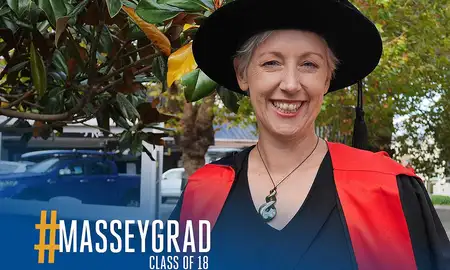
Food insecurity hosts a range of negative impacts on physical and mental wellbeing, with Māori households being twice as likely to experience it than non-Māori households. With one in four Māori adults living in a low-income household and 47 per cent of sole parent beneficiaries being Māori, wāhine Māori often bear the burden.
The research, conducted by Master of Science (Human Nutrition) graduate Joanne Urlich (Ngāti Kahu, Ngāti Tahu) and co-supervised by Professor of Public Health Nutrition Carol Wham and Associate Professor Geoff Kira, aimed to explore the perspective of Māori mothers living in Kaitaia and their experience meeting food access needs for their whānau.
Kaitaia is one of the most socioeconomically deprived areas of Aotearoa New Zealand and home to a population of 32.4 per cent Māori. Of the 20 mothers who participated in the study, a quarter were sole parents and household sizes ranged from three to 13 with 80 per cent receiving some form of welfare payment.
The in-depth interviews explored dietary habits, routines, methods of food procurement, nutrition knowledge and skills and perceptions towards healthy food. Three themes emerged from the interviews, with the first being ensuring the whānau is fed. Professor Wham says family wellbeing is prioritised, rather than the needs of the mothers.
“Food purchases were primarily driven by hunger and price – with participants acknowledging the food was not necessarily nutritious but inexpensive and filling, such as bread, pasta and noodles. Mothers reported high levels of stress when their child’s food is compromised and that it’s common for mothers to miss meals, usually breakfast, to ensure everyone else gets fed.”
“Many of our participants displayed sound nutrition knowledge and cooking skills, showing health promotions and healthy food messaging is working, but they didn’t have the resources to act on this knowledge,” Professor Wham adds.
The second theme revealed many participants access food from multiple sources out of necessity and find it to be a time-consuming practice. Food avenue options included food rescue centres, food banks and charitable organisations, as well as food foraging such as hunting, fishing and gathering.
Professor Wham says as there is one supermarket monopolising the region, locating inexpensive food elsewhere has become standard with participants employing innovation, organisation and connection to do so.
“Access challenges arise due to travel costs and having children with them. Food grants are regularly accessed but involve considerable time, effort and stress. In many cases, community gardens and pantries were not accessed due to the belief that others out there needed it more than them. Despite the mothers not perceiving themselves as food insecure, the reality of having to rely on support systems to meet food requirements for their whānau was mentioned as burdening their resilience.”
Connection alleviated some of the pressure and stress involved in food sourcing and was reiterated by all participants in unique and specific ways. The strategies employed were more effective when connections were stronger among whānau, but this avenue was not possible for all participants, so other connections such as community groups would be accessed.
“Being connected, particularly digital connectivity, can reduce a lot of the burden involved in sourcing food. It can enhance social connections, with their community and friends, and offer additional resources,” Professor Wham says.
The final emerging theme was finding ways to cope with the unexpected costs and events negatively impacting food access, such as unstable housing, health issues and tangihanga. Professor Wham says when these events occur, it poses a dilemma for participants as it requires them to seek additional funding from welfare agencies.
“Seeking additional help has resulted in many of the mothers being questioned on their ability to budget and care for the family, leaving them feeling inadequate. Most participants have developed coping strategies to deal with the unexpected, but with housing, medical care and other fixed expenses rising, food is the only modifiable portion of their budget and is sacrificed to meet other more urgent needs.”
Many participants detailed the negative impacts on their health and wellbeing due to having insufficient food to feed their families, including stress, anxiety and depression. Analysing the interviews showed the strategies employed were more effective with strong connections to whānau and community but are not enough to resolve the struggle.
Professor Wham says the compromises made can undermine Māori mothers’ long-term ability to escape from socioeconomic distress and changes needed to be made at a structural level rather than taking an individual focus.
“This research focuses on one community, but it illustrates issues that are replicated throughout the country, making it a societal issue. Government strategies to address food insecurity and a systems-based approach is needed to ensure a living wage equates to being able to access nutrient-rich food and healthy diets for all. Increasing accessibility to a broad range of kai can allow families to fully enact their nutrition knowledge, improving health and wellbeing for whānau.”
Research paper: Urlich, J. L., Kira, G., & Wham, C. A. (2023). Māmā Ki Tama: Feeding Families in a Food Insecure Environment: A Qualitative Study. Journal of Hunger & Environmental Nutrition, 9(13). DOI: 10.1080/19320248.2023.2243448
Related news
Uni Experience programme helps to decide future path for high school student
Student Emma Udy has now enrolled in a Bachelor of Science majoring in Human Nutrition after attending Massey's Uni Experience course in January.

Opinion: Kai and COVID-19
Access to healthy Food is an issue that may hit Māori whānau hard during the COVID-19 crisis. Māori need Māori solutions at times like this and he has some suggestions, says Dr Geoff Kira.

Going hungry – PhD exposes reality of food insecurity
A family discussing scavenging for food in rubbish bins and the ethics of killing a pet rabbit for meat is just one story from Dr Rebekah Graham's doctoral study on New Zealanders experiencing food insecurity.
